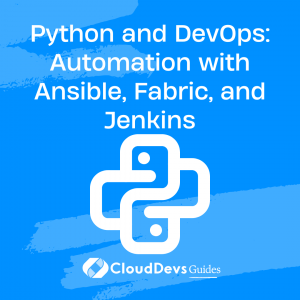Python and DevOps: Automation with Ansible, Fabric, and Jenkins
Table of Contents
DevOps is an increasingly popular approach to software development that emphasizes collaboration and automation between development and operations teams. Python is a powerful language that is well-suited to automation, and there are several popular tools in the Python ecosystem that can be used for DevOps automation, including Ansible, Fabric, and Jenkins.
In this blog post, we will explore how to use these tools to automate common DevOps tasks.
1. Ansible
Ansible is a popular configuration management tool that allows you to automate the deployment and configuration of servers and applications. Ansible uses a YAML-based syntax to define tasks, making it easy to learn and use.
Ansible is typically used in conjunction with SSH, allowing you to remotely execute tasks on servers. Here is an example of a simple Ansible playbook that installs the Apache web server on a remote server:
---
- hosts: web_servers
tasks:
- name: Install Apache
apt:
name: apache2
state: present
In this playbook, we define a host group called web_servers and specify a task to install the Apache web server using the apt module.
2. Fabric
Fabric is a Python library that allows you to automate command-line tasks, such as deploying code, running tests, and managing servers. Fabric uses a Python-based syntax, making it easy to use for Python developers.
Here is an example of a Fabric script that deploys a Django application to a remote server:
from fabric.api import env, run
env.hosts = ['example.com']
env.user = 'deploy'
env.key_filename = '~/.ssh/id_rsa'
def deploy():
with cd('/var/www/myapp'):
run('git pull')
run('pip install -r requirements.txt')
run('python manage.py migrate')
run('sudo service apache2 restart')
In this script, we define a deploy task that uses Fabric’s run function to execute shell commands on the remote server. We use the cd context manager to set the working directory on the remote server before executing commands.
3. Jenkins
Jenkins is a popular continuous integration and continuous deployment (CI/CD) tool that allows you to automate the building, testing, and deployment of your code. Jenkins provides a web-based interface for managing jobs, making it easy to set up and use.
Here is an example of a simple Jenkins job that builds and deploys a Python application:
- Create a new Jenkins job and select “Freestyle project”.
- In the “Source Code Management” section, select “Git” and enter the URL of your Git repository.
- In the “Build” section, add a build step to run the following shell script:
#!/bin/bash virtualenv env source env/bin/activate pip install -r requirements.txt python manage.py test
- In the “Post-build Actions” section, add a post-build action to deploy the application to a remote server using Ansible or Fabric.
4. Conclusion
In this blog post, we have explored how to use Python tools like Ansible, Fabric, and Jenkins to automate common DevOps tasks. By using these tools, you can increase the speed and efficiency of your software development process, while also improving code quality and reducing errors. We hope this has been a helpful introduction to DevOps automation with Python.
